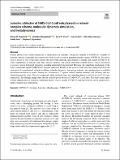Luteolin: a blocker of SARS-CoV-2 cell entry based on relaxed complex scheme, molecular dynamics simulation, and metadynamics

View/
Date
2021-07-08Author
Shadrack, Daniel
Deogratias, Geradius
Kiruri, Lucy
Onoka, Isaac
Vianney, John-Mary
Swai, Hulda
Nyandoro, Stephen
Metadata
Show full item recordAbstract
Natural products have served human life as medications for centuries. During the outbreak of COVID-19, a number of
naturally derived compounds and extracts have been tested or used as potential remedies against COVID-19. Tetradenia
riparia extract is one of the plant extracts that have been deployed and claimed to manage and control COVID-19 by
some communities in Tanzania and other African countries. The active compounds isolated from T. riparia are known
to possess various biological properties including antimalarial and antiviral. However, the underlying mechanism of the
active compounds against SARS-CoV-2 remains unknown. Results in the present work have been interpreted from the
view point of computational methods including molecular dynamics, free energy methods, and metadynamics to establish
the related mechanism of action. Among the constituents of T. riparia studied, luteolin inhibited viral cell entry and was
thermodynamically stable. The title compound exhibit residence time and unbinding kinetics of 68.86 ms and 0.014 /ms,
respectively. The findings suggest that luteolin could be potent blocker of SARS-CoV-2 cell entry. The study shades lights
towards identification of bioactive constituents from T. riparia against COVID-19, and thus bioassay can be carried out to
further validate such observations.
